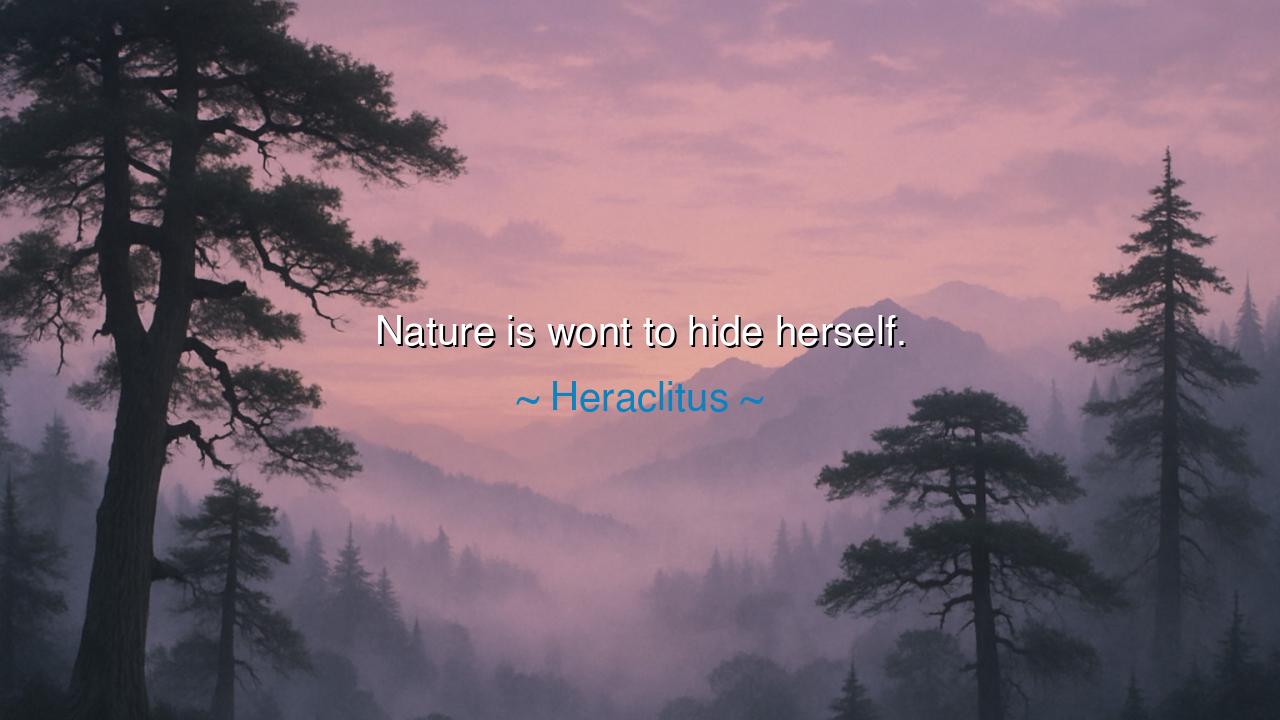
Nature is wont to hide herself.






Hear the ancient voice of Heraclitus, the dark philosopher of Ephesus, who uttered: “Nature is wont to hide herself.” This is no simple remark, but a riddle carved into the heart of the cosmos. For Heraclitus knew that the world is layered, that truth does not stride naked in the open fields, but veils herself like a queen behind curtains of mystery. The rivers flow, the stars burn, the seasons turn, yet their deeper law is concealed. The surface is but a mask, and only the seeker with eyes of fire may pierce it.
Heraclitus spoke in fragments, for he believed that wisdom cannot be handed like a stone, but must be uncovered like buried treasure. To him, Nature was not a thing easily grasped, but an ever-living fire, shifting, hidden, elusive. She cloaks herself in paradox, that men may not seize her cheaply. She demands labor, contemplation, reverence. In this fragment, he warns us: truth lies not in the obvious, but in the veiled; the essence of things is always more than what appears.
Consider the story of Isaac Newton, who watched an apple fall. To most, it was but fruit tumbling to earth, a common event. Yet Newton, like one who heeds Heraclitus, sought what was hidden. Beneath the fall, he discerned the secret law of Nature—gravity itself, binding earth to heavens. The apple was the veil; the law was the hidden face. Thus, Heraclitus’ words ring true: Nature hides, and only the one who questions deeply uncovers her truth.
So too in the lives of men. Many look upon their days and see only chance or fate. They perceive only surface: success or failure, joy or sorrow. Yet beneath these events lies hidden purpose, the deeper harmony of existence. Just as the river hides the current that drives it, so life conceals its meaning beneath appearances. The wise do not rest content with what is seen; they press beyond, seeking the pattern behind the veil.
The meaning, then, is clear: Nature teaches through concealment. She does not pour wisdom into the lap of the slothful, but hides herself so that the diligent may seek, so that wonder may endure, so that humility may guard against arrogance. If truth were too easily found, men would treat it cheaply. But because Nature hides, the discovery of her secrets becomes sacred, a reward for patience and reverence.
Thus the lesson for you, listener, is this: when you behold the world, do not be deceived by the surface. Ask always what lies beneath. When confronted by mystery, do not despair—it is Nature’s way of inviting you into her inner chambers. Cultivate the virtues of inquiry, perseverance, and humility. Read the signs of the earth, the stars, and your own heart, for all are written in riddles. To live well is not to accept appearances, but to search for what is hidden.
Practical steps are given: observe more deeply, question more boldly, seek not only what is easy but what is veiled. Study the sciences, but also ponder the silences. Watch the smallest details—a leaf, a drop of water, the flight of a bird—for in them Nature whispers her hidden truths. And in your own soul, seek beneath your impulses the deeper currents of your being. For there, too, Nature hides herself.
So remember the words of Heraclitus: “Nature is wont to hide herself.” Live as one who honors the mystery, who reveres the hidden, who seeks truth with patient eyes. For the veil is not meant to frustrate you, but to purify your desire for wisdom. And when at last you lift it, the vision will be all the more glorious for having been concealed.






AAdministratorAdministrator
Welcome, honored guests. Please leave a comment, we will respond soon